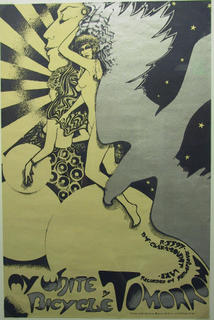
Tomorrow - (Tomorrow (1970)
http://rapidshare.de/files/4963702/8_.part1.rar
http://rapidshare.de/files/4963710/8_.part2.rar
http://rapidshare.de/files/4963713/8_.part3.rar
http://rapidshare.de/files/4963692/8_.part4.rar
pw = posted_first_at_chocoreve
Review by Richie Unterberger
Tomorrow's sole album was a solid effort, with quite a few first-rate tracks. "My White Bicycle" was one of the first songs to prominently feature backwards guitar phasing, "Real Life Permanent Dream" has engaging English harmonies and sitar riffs, "Revolution" is an infectious hippie anthem, and "Now Your Time Has Come" features intricate riffing from Steve Howe. "Hallucinations," with its irresistible melody, gentle harmonies, and affectingly trippy lyrics, was perhaps their best track. The more self-conscious English whimsy — populated by jolly little dwarfs, Auntie Mary's dress shop, colonels, and the like — is less successful, although the band's craftsmanship is strong enough to avoid embarassment. The 1986 reissue of this album features detailed liner notes and the worthy B-side "Claremont Lake," though unfortunately West's sappy but influential "Excerpt From A Teenage Opera" was deleted.
Biography by Richie Unterberger
In the early days of British psychedelia, three bands were consistently cited as first-generation figureheads of the London-based underground sound: Pink Floyd, the Soft Machine, and Tomorrow. Pink Floyd became superstars and the Soft Machine influential cult legends, but Tomorrow is mostly remembered (if at all) for featuring Steve Howe as their lead guitarist in his pre-Yes days. Actually, Tomorrow was nearly the equal of the two more celebrated outfits. Along with the early Floyd and Soft Machine, they shared a propensity for flower-power whimsy. Though they were less recklessly innovative and imaginative, their songwriting was accomplished, with adroit harmonies, psychedelic guitar work, and adventurous structures and tempo changes. They never succumbed to mindless indulgence or jamming; indeed, their tracks were rather short and tightly woven in comparison with most psychedelic bands. A couple singles (especially "My White Bicycle") were underground favorites, but the group only managed to record one album before breaking up in 1968. Lead singer Keith West, even before the breakup, had a number two British hit with "Excerpt From a Teenage Opera," which helped inspire Pete Townshend's Tommy. Drummer Twink joined the Pretty Things and, later, the Pink Fairies.

No comments:
Post a Comment